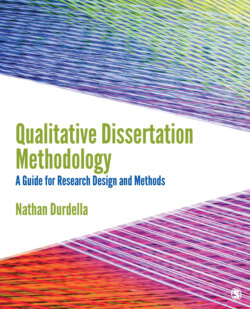Читать книгу Qualitative Dissertation Methodology - Nathan Durdella - Страница 50
На сайте Литреса книга снята с продажи.
Dissertation rituals.
ОглавлениеWithin program and department environments, the traditional dissertation research process tends to be marked by a series of progressive developmental steps, which serve to support project design and execution, skills acquisition, and socialization for students. In fact, these steps, or events, in the context of the dissertation research process generally function as a set of cultural rituals that advising faculty reproduce among new members of the field. In what can be considered an apprenticeship model of academic training, dissertation rituals prepare advanced graduate students for expectations of junior faculty members, including the process of tenure and promotion (Smith, 2010b). While academic training in the form of dissertation research may not necessarily lead to a post with your chair (Bronfrenbrenner & Juravich, 2001), the ritualistic behaviors related to dissertations in which faculty advisors engage intensify the cultural bonds between senior, junior, and new members of the field and support the development of a set of marketable skills for students. Indeed, this advising model allows students to navigate a supervised research process—from conceptualization to implementation and dissemination. But that is not the end of it—establishing and maintaining relationships, managing expectations, meeting deadlines, and participating in private and public events allow faculty advisors to assess the value and quality of advisees’ dissertation research, enforcing standards that the larger group sets.
Traditional dissertation rituals frequently take place in curricular and advising contexts. Across general and specific areas of program focus—for example, applied programs that train scholar-practitioners—teaching and advising faculty tend to formally structure events in the dissertation research process in coursework. Here, a range of dissertation research topics may appear in research methods course sequences (where qualitative research design and methods may be explored), yearlong dissertation seminars (where literature reviews and research backgrounds may be developed), and field-based classes (where mini dissertation studies may be piloted). Alongside formal course requirements, advising tends to be where most programs situate events in the dissertation research process. In fact, the most substantive and meaningful dissertation work tends to take place directly with program faculty as dissertation chair or committee members. Taken together, ritualistic events associated with monograph or book-length dissertation research usually transpire in large part over an extended period (of years) in clusters of activity as follows below.
Dissertation Advising as Research Apprenticeship
Dissertation research rituals promote contact with your chair through an advising process that supports your study. The practice of consulting your chair and members of your dissertation committee offers you an opportunity to be trained by experts in your chosen field of study. Working closely with an expert in the field emerged out of a type of apprenticeship system to train new scholars in the standards of social and behavioral science research, and designing and executing a rigorous, systematic investigation into human social or behavioral phenomena require the supervision of someone who knows how to go about setting up and working within specific research approaches. Over time, this training supports your development as a researcher and identifies you with an established or senior member of the field.
